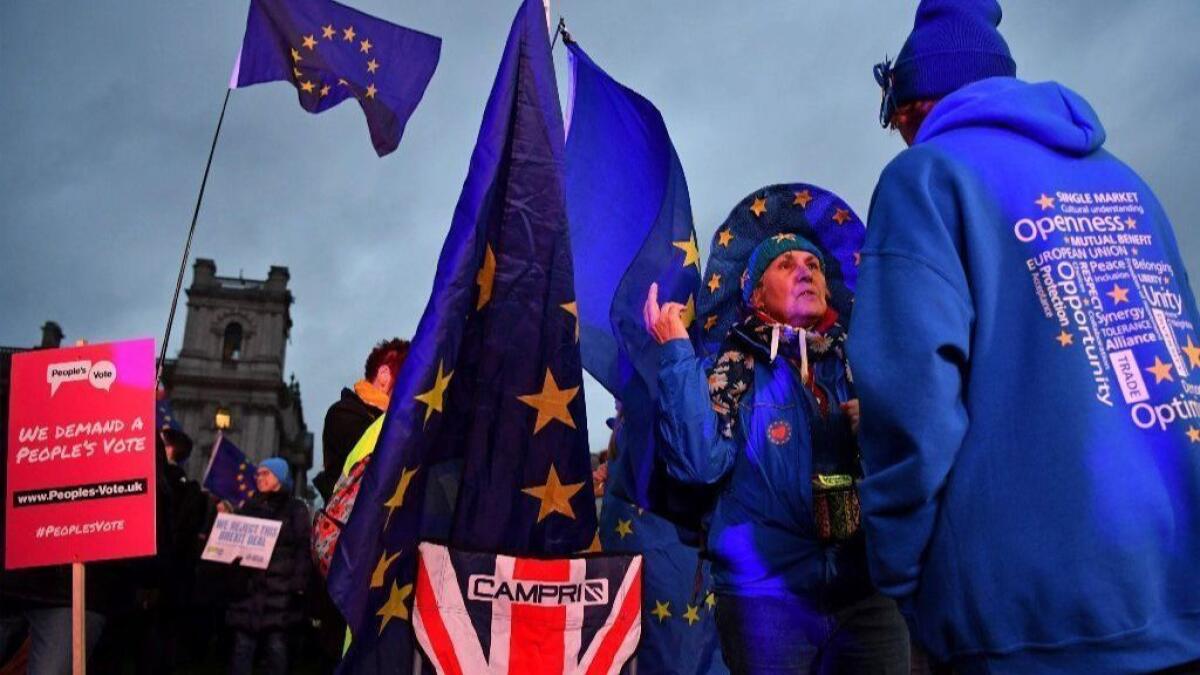Some potential scenarios for Britain and the European Union after Brexit plan’s crushing defeat

It’s been a long 2 ½ years since Britons narrowly voted to leave the European Union – and to many, it feels like a short 2½ months before that momentous decision is to take effect, on March 29.
Here are some scenarios going forward after Tuesday’s crushing parliamentary defeat for Prime Minister Theresa May’s plan for the terms of Brexit, Britain’s planned exit from the 28-member bloc.
No confidence
Within moments of the parliamentary vote, the head of the opposition Labor Party called for a vote of no confidence in May’s government. Though wounded, she looked fairly well-positioned to survive. The prime minister could also step down voluntarily, but she’s endured a series of humiliations without raising that as a prospect. May could also call for a general election. She became prime minister after the Brexit referendum in 2016.
Delayed departure
After the 2016 vote, Britain triggered Article 50 of the EU’s principal treaty, starting a two-year countdown clock for departure. But May could ask the EU for an extension beyond March 29, which the bloc, seeking to avoid even greater chaos, would likely grant. At least one parliamentary faction has already called for a postponement.
Tweaking the deal
Before Tuesday’s vote, the EU firmly ruled out any substantive changes in the negotiated accord, saying the deal that Parliament rejected was the only one on offer. May could return to Brussels to search for some small concessions and bring those before British lawmakers for another vote. But mere tweaks would be unlikely to change the outcome in Parliament.
Second referendum
May has argued passionately that putting the question to a referendum once again would undermine Britain’s democracy, so she’s unlikely to support a do-over “People’s Vote.” But the re-vote idea, which would need parliamentary approval, has considerable public support. The EU would be unlikely to object if British voters backed away from the earlier decision; its highest court ruled late last year that Britain could unilaterally change its mind about leaving. But bitter domestic divisions over issues like sovereignty and immigration would likely roar to the fore — as they did in the original Brexit vote, which was decided by a slim 52% to 48%.
Crashing out
Leaving the EU with no accord in place – “crashing out” -- has been described by economists as a doomsday scenario, highly disruptive to trade and likely to set off a deep recession in Britain, while also harming economies on the Continent. British consumers might face heavy expense and scarcity of goods that were previously freely available, such as certain medications. Most lawmakers oppose crashing out, although for very different reasons. But the parliamentary mechanism for preventing it is unclear.
More to Read
Start your day right
Sign up for Essential California for news, features and recommendations from the L.A. Times and beyond in your inbox six days a week.
You may occasionally receive promotional content from the Los Angeles Times.






